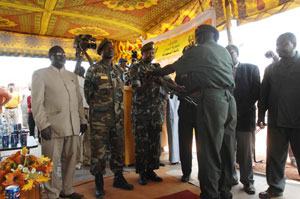South Sudan’s reintegration insufficiently planned: report
By Julius N. Uma
June 26, 2010 (JUBA) — The ongoing re-integration process being spearheaded by Southern Sudan DDR Commission (SSDDRC), was insufficiently planned prior to its implementation, a new working paper has revealed.
 The 56-paged paper, entitled, “Unrealistic Expectations: Current Challenges to Reintegration in Southern Sudan” was released by the Small Arms Survey’s Sudan Human Security Baseline Assessment (HSBA) project.
The 56-paged paper, entitled, “Unrealistic Expectations: Current Challenges to Reintegration in Southern Sudan” was released by the Small Arms Survey’s Sudan Human Security Baseline Assessment (HSBA) project.
The HSBA, for starters, generates and disseminates timely, empirical, field-based research on small arms, armed violence, and insecurity in Sudan.
As such, the 56-paged paper reviews progress to date on the disarmament, demobilization, and reintegration (DDR) of ex-combatants in Southern Sudan, focusing specifically on the reintegration component.
DDR of ex-combatant in the semi-autonomous region began in 2009, amidst growing concerns of insecurity, political tensions, and financial turmoil for the Government of Southern Sudan (GoSS).
“Despite these delays, expectations about the process remain high in the South, although different actors see it as a means to different ends: of cutting the inflated Sudan People’s Liberation Army payroll; of improving ex-combatants’ socio-economic conditions; and of stabilizing security in areas where it is taking place,” a section of the paper partly reads.
“Yet these expectations are often unrealistic and exist side by side with mounting concerns about its overall feasibility and the risks associated with the current implementation strategy,” it adds.
Citing lessons learnt from reintegration of returnees and preliminary outcomes of DDR involvement in Central Equatoria and Lakes States in South Sudan, authors of the working paper advocated for long-term support and adequate follow-up mechanism, if DDR is to be improved and sustained to foster economic recovery and development.
In addition, the working paper says communities, including local authorities need to be sufficiently involved in DDR planning and implementation in order to reduce risk associated with spreading misinformation, misperceptions, and unrealistic expectations.
“The decision to adopt an individual-based reintegration programme rather than a community-based one is placing the burden of economic and social reintegration primarily on the shoulders of the communities absorbing the ex-combatants,” the paper notes, adding that, “This dynamic is not sustainable because communities are often even worse off economically than the ex-combatants.”
Ms Julie Brethfeld from the Geneva-based Graduate Institute of International and Development Studies authored the working paper.
(ST)
